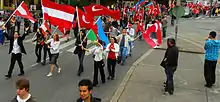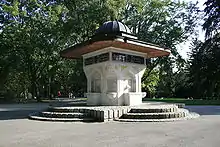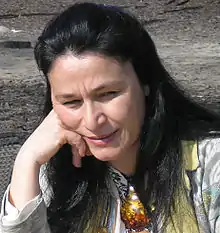Turks in Austria
Turks in Austria, also referred to as Turkish Austrians and Austrian Turks, (German: Türken in Österreich; Turkish: Avusturya'daki Türkler) are people of Turkish ethnicity living in Austria. They form the second largest ethnic group in the country after the ethnic Austrian people. The majority of Austrian Turks descend from the Republic of Turkey; however there has also been significant Turkish migration from other post-Ottoman countries including ethnic Turkish communities which have come to Austria from the Balkans (especially from Bulgaria, Greece, Kosovo, North Macedonia and Romania), the island of Cyprus, and more recently Iraq and Syria.
 Turkish day in Vienna, Austria (2009) | |
| Total population | |
|---|---|
| 185,592 (Turkish citizens only)[1]
Austrians of Turkish origin: 360,000 (2011 est. by the Initiative Minderheiten)[2] 400,000 (2010 est. by Ariel Muzicant)[3] 500,000 (est. by Andreas Mölzer)[4] | |
| Regions with significant populations | |
| Languages | |
| Religion | |
History
Turkish people were recruited to Austria as Gastarbeiter (guest workers) for the construction and export industries following an agreement with the Turkish government in 1964. From 1973 the policy of encouraging guest workers ended and restrictive immigration laws were introduced, first with the 1975 Aliens Employment Act, setting quotas on work permits, and then the 1992 Residence Act, which set quotas for residency permits without the right to work. A more restrictive system was put in place in 1997 and further limits imposed in 2006.
Since the 1970s Turks living and working in Austria have focused on family reunification and on seeking Austrian citizenship, for which they need to have lived in Austria for 10 years.
Population

The Turkish community, including descendants, form the largest ethnic minority in Austria. In 2011 a report by the Initiative Minderheiten said that there was 360,000 people of Turkish origin living in Austria.[2] This figure has also been echoed by the former Austrian Foreign Minister and current Chancellor of Austria Sebastian Kurz.[5] By 2010 Ariel Muzicant said that the Turks in Austria already numbered 400,000.[2] Another estimate by the former Austrian MEP, Andreas Mölzer, has claimed that there are 500,000 Turks in the country.[4] Most of the Austrian-Turkish community descend from Turkey, however, there are also Turkish communities which have migrated to Austria from Bulgaria[6] and Greece.
Notable people
 Taner Ari, football player
Taner Ari, football player.jpg.webp) Cem Atan, football player
Cem Atan, football player Turhan Bey, actor
Turhan Bey, actor.jpg.webp) Bülent Kaan Bilgen, football player
Bülent Kaan Bilgen, football player Ekrem Dağ, football player
Ekrem Dağ, football player Harun Erbek, football player
Harun Erbek, football player Emel Heinreich, actress, author and film-director
Emel Heinreich, actress, author and film-director Veli Kavlak, football player
Veli Kavlak, football player.jpg.webp) Tanju Kayhan, football player
Tanju Kayhan, football player Alev Korun, congresswoman in the Austrian Parliament
Alev Korun, congresswoman in the Austrian Parliament Ramazan Özcan, football player
Ramazan Özcan, football player.jpg.webp) Yasin Pehlivan, football player
Yasin Pehlivan, football player
References
- "Kommission für Migrations und Integrationsforschung der Österreichischen Akademie der Wissenschaften" (PDF). Statistik Austria. 2012. p. 27.
- Warum die Türken? (PDF), 78, Initiative Minderheiten, 2011,
Was sind die Gründe für dieses massive Unbehagen angesichts von rund 360.000 Menschen türkischer Herkunft?
- Weiss, Alexia. "Erheblicher Anstieg antisemitischer Vorfälle in Wien". Jüdische Allgemeine. Retrieved 3 November 2020.
Muzicant wandte sich am Donnerstag in einem Brief an alle Gemeindemitglieder. Er sichert darin Hilfe der IKG zu und ruft alle, die Opfer solcher Übergriffe werden, auf, sich bei der Kultusgemeinde zu melden und Anzeige bei der Polizei zu erstatten. »Wir dürfen nicht zulassen, dass der Antisemitismus jetzt auf die 400.000 in Österreich lebenden Türken übergreift.«
- Mölzer, Andreas. "In Österreich leben geschätzte 500.000 Türken, aber kaum mehr als 10–12.000 Slowenen". Archived from the original on 2012-07-22. Retrieved 30 October 2020.
- Turkey angry after Erdogan is told he can't campaign in Austria, The Local, 2017,
Austrian Foreign Minister Sebastian Kurz said Erdogan is "not welcome" to hold campaign events, adding that it would "increase friction" in Austria and prevent the integration of a 360,000-strong minority of Turkish origin.
- Balkan Türkleri Kültür ve Dayanışma Derneği. "Avusturya'daki Bulgaristan Türkleri hala Bulgar isimlerini neden taşıyor?". Retrieved 2011-10-18.
Bibliography
- Abadan-Unat, Nermin (1976), Turkish Workers in Europe 1960-1975: A Socio-economic Reappraisal, BRILL, ISBN 90-04-04478-7.
- Abbott, John S. C. (2007), The Empire of Austria: Its Rise and Present Power, BiblioBazaar, ISBN 978-1-4264-9252-5.
- Ache, Peter (2008), Cities Between Competitiveness and Cohesion: Discourses, Realities and Implementation, Springer, ISBN 978-1-4020-8240-5.
- Akgündüz, Ahmet (2008), Labour Migration from Turkey to Western Europe, 1960-1974: A Multidisciplinary Analysis, Ashgate Publishing, ISBN 978-0-7546-7390-3.
- Bauböck, Rainer (2006), Migration and Citizenship: Legal Status, Rights and Political Participation, Amsterdam University Press, ISBN 90-5356-888-3.
- Bhatia, Tej K.; Ritchie, William C. (2006), The Handbook of Bilingualism, Wiley-Blackwell, ISBN 0-631-22735-0.
- Boswell, Christina; Royal Institute of International Affairs (2003), European Migration Policies in Flux: Changing Patterns of Inclusion and Exclusion, Wiley-Blackwell, ISBN 1-4051-0296-9.
- Dana, Leo Paul (2008), Handbook of Research on Ethnic Minority Entrepreneurship: A Co-evolutionary View on Resource Management, Edward Elgar Publishing, ISBN 978-1-84542-733-7.
- Frejka, Tomaš; Hoem, Jan Michael; Toulemon, Laurent; Sobotka, Tomáš (2008), Childbearing Trends and Policies in Europe, Books on Demand, ISBN 978-3-8370-6187-1.
- Hunter, Shireen (2002), Islam, Europe's Second Religion: The New Social, Cultural, and Political Landscape, Greenwood Publishing Group, ISBN 0-275-97609-2.
- Kasaba, Reşat (2008), The Cambridge History of Turkey: Volume 4, Turkey in the Modern World, Cambridge University Press, ISBN 978-0-521-62096-3.
- Kohl, Katrin Maria; Robertson, Ritchie (2006), A History of Austrian Literature 1918-2000, Boydell & Brewer, ISBN 1-57113-276-7.
- Martin, Philip L.; Weil, Patrick (2006), Managing Migration: The Promise of Cooperation, Lexington Books, ISBN 0-7391-1341-0.
- Matzka, Christian (2009), Austria and Turkey: their burden of histories (PDF), http://www.herodot.net/: University of Vienna
- Nielsen, Jørgen S. (2004), Muslims in Western Europe, Edinburgh University Press, ISBN 0-7486-1844-9.
- Nikolov, Marianne; Curtain, Helena (2000), An Early Start: Young Learners and Modern Languages in Europe and Beyond, Council of Europe, ISBN 92-871-4411-7.
- Organisation for Economic Co-operation and Development (2008), International Migration Outlook: SOPEMI 2008, OECD Publishing, ISBN 978-92-64-04565-1.
- Panayi, Panikos (1999), Outsiders: A History of European Minorities, Continuum International Publishing Group, ISBN 1-85285-179-1.
- Plender, Richard (1988), International Migration Law, Martinus Nijhoff Publishers, ISBN 90-247-3604-8.
- Potz, Richard; Wieshaider, Wolfgang (2004), Islam and the European Union, Peeters Publishers, ISBN 90-429-1445-9.
- Statistik Austria (2017), Bevölkerung zu Jahresbeginn seit 2002, Statistik Austria
- Waardenburg, Jacques (2003), Muslims and Others: Relations in Context, Walter de Gruyter, ISBN 3-11-017627-0.
Further reading
- Kroissenbrunner, Sabine (July 2003), "Islam and Muslim Immigrants in Austria: Socio-Political Networks and Muslim Leadership of Turkish Immigrants", Immigrants and Minorities, 22 (2–3): 188–207, doi:10.1080/0261928042000244826.
- Wets, Joha (March 2006), "The Turkish Community in Austria and Belgium: The Challenge of Integration", Turkish Studies, 7 (1): 85–100, doi:10.1080/14683840500520600.
